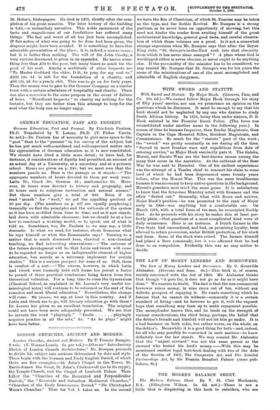THE LAW OF MONEY LENDERS AND BORROWERS.
The Law of Money Lenders and Borrowers. By C. Grenville Alabaster. (Stevens and Sons. 6s.)—This book is, of course, mainly concerned with the Act of 1900. Mr. Alabaster thinks that though " it goes far, it does not go as far as it might have done." We venture to doubt. The fact is that the non-commercial borrower raises money, in nine cases out of ten, without any definite prospect of repaying it. He wants something which he fancies that he cannot do without—commonly it is a certain standard of living—and he borrows to get it, with the vaguest hope that something may turn up to make repayment possible. The moneylender knows this, and he lends on the strength of various considerations, the chief being, perhaps, the belief that the debtor's friends and kinsfolk will not let him go under. It is a bad business on both sides, but rather worse, on the whole, on the debtor's. Meanwhile it is a good thing for both—and, indeed, for all who may possibly be concerned in such matters—to know definitely how the law stands. We may remind Mr. Alabaster that the " unjust steward" was not the same person as the steward who buried his lord's money.—With this may be mentioned another legal text-book dealing with two of the Acts of the Session of 1907, The Companies Act, and The Limited Partnerships Act, by Sir Francis Beaufort Palmer (same pub- lishers, 6s.)
























































 Previous page
Previous page